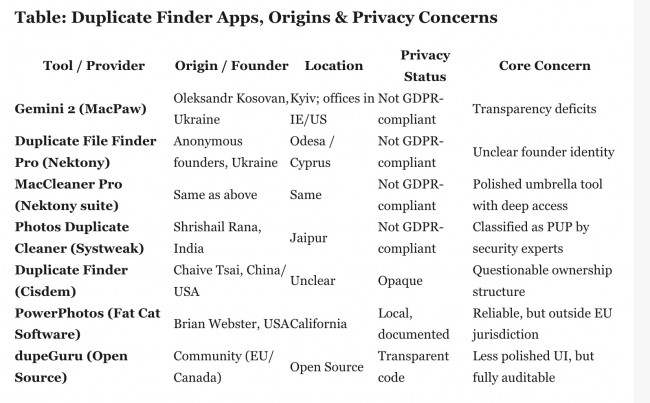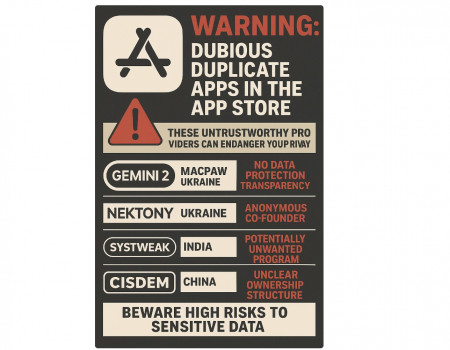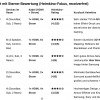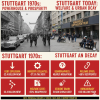
Dubious Duplicate Finders in Apple’s App Store – and Apple Conceals the Risks

Even when an app appears convenient, many duplicate-finder tools cannot be trusted—and they pose a serious threat to privacy. NETZ-TRENDS.de emphasizes that it’s not enough to regulate which apps may be offered in the App Store; it is equally vital to mandate how these apps are labeled and transparently presented. In the sensitive domain of app distribution, the EU must enact far stricter laws to reliably protect users from privacy breaches and data exploitation.
Convenience at What Cost?
What is promoted as a way to tidy up your MacBook, laptop, or smartphone by finding duplicate files often demands deep access to your most personal data. The real danger lies not in the utility itself but in the potential for misuse or monetization of sensitive information.
The All-In-One Facade: MacCleaner Pro
Among these tools, MacCleaner Pro stands out under a benign and appealing label: “Clean up and speed up your Mac with a few clicks. Get an all-in-one professional software to take care of your Mac.” On the surface that sounds helpful. In reality, MacCleaner Pro bundles multiple functions under one roof—duplicate finding, junk cleaning, app uninstalling, memory clearing—delivering power at the cost of privacy. This sleek presentation masks the underlying risk: the tool has access to your complete data ecosystem.

Reviews describe MacCleaner Pro as a convenient suite that helps identify duplicates, analyze disk usage, and free up space—sometimes even across iCloud libraries. But with this smooth vector comes the potential for overreach. Once installed, the app gains access to files that may include photos, documents, or other sensitive content—raising serious concerns about what happens behind the scenes.
Questionable Providers Behind the Tools
Nektony, the developer behind MacCleaner Pro (and others like Duplicate File Finder Pro), originates from Ukraine and has been active since 2011. Yet, its founders remain at best vaguely identified. Other providers—like MacPaw (Gemini 2), Systweak, and Cisdem—also operate from jurisdictions outside the EU, with limited transparency about ownership, legal accountability, or data handling practices.
Table: Duplicate Finder Apps, Origins & Privacy Concerns
| Tool / Provider | Origin / Founder | Location | Privacy Status | Core Concern |
|---|---|---|---|---|
| Gemini 2 (MacPaw) | Oleksandr Kosovan, Ukraine | Kyiv; offices in IE/US | Not GDPR-compliant | Transparency deficits |
| Duplicate File Finder Pro (Nektony) | Anonymous founders, Ukraine | Odesa / Cyprus | Not GDPR-compliant | Unclear founder identity |
| MacCleaner Pro (Nektony suite) | Same as above | Same | Not GDPR-compliant | Polished umbrella tool with deep access |
| Photos Duplicate Cleaner (Systweak) | Shrishail Rana, India | Jaipur | Not GDPR-compliant | Classified as PUP by security experts |
| Duplicate Finder (Cisdem) | Chaive Tsai, China/USA | Unclear | Opaque | Questionable ownership structure |
| PowerPhotos (Fat Cat Software) | Brian Webster, USA | California | Local, documented | Reliable, but outside EU jurisdiction |
| dupeGuru (Open Source) | Community (EU/Canada) | Open Source | Transparent code | Less polished UI, but fully auditable |
Apple’s Oversight Is Insufficient
Despite Apple’s emphasis on quality control and security, the App Store often features apps whose providers are beyond European legal reach and lack full transparency. Users are led to believe these tools have been rigorously vetted—when in fact many evade meaningful scrutiny.
A Clear Call from NETZ-TRENDS.de
NETZ-TRENDS.de recommends that those prioritizing data sovereignty should avoid duplicate-finder apps from Ukraine, India, China, or similar jurisdictions. Until the App Store enforces clear labeling indicating developers’ origins, privacy compliance, and associated risks, apps like MacCleaner Pro remain part of a digital bazaar where convenience displaces caution.
The Dangerous Illusion of Safety
These seemingly helpful tools are no minor nuisance. They represent a tangible risk, allowing software to penetrate the most private layers of daily digital life. The App Store’s illusion of trust becomes its greatest hazard.





